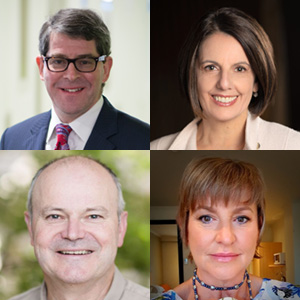STEM & Society: Caring for the Rare
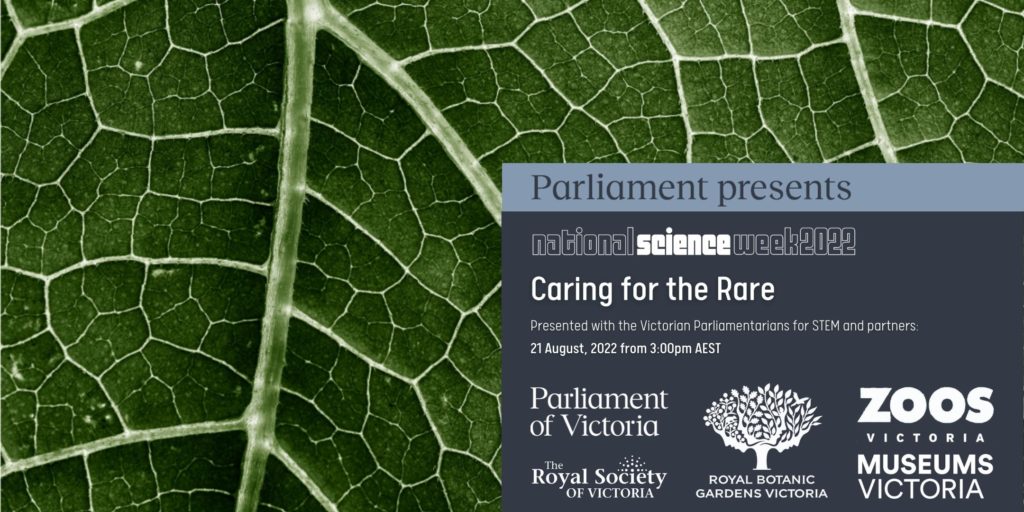
Victoria’s Zoos, Museums and Botanic Gardens are more than interesting places for people to visit - they are also engines of cutting-edge research and field work.
Our State’s remarkable botanical collections and zoological species are carefully managed by Royal Botanic Gardens Victoria and Zoos Victoria, while Museums Victoria maintains significant collections related to the natural history of our region and the wider world.
Our panel of leading experts will discuss initiatives such as the Care for the Rare program and the Victorian Conservation Seedbank, the Wildlife BioBank of tissue and DNA samples cryogenically stored by Museums Victoria, and the captive breeding programs for species on the brink of extinction, diligently nurtured back to population health by biologists and ecologists at Zoos Victoria.
Join us for a special online event, streamed live from Victoria’s Parliament House during National Science Week 2022, to hear from the botanists, zoologists and collection managers leading this important work. Find out about the ways they are planning to help our plants and animals adapt and persist through multiple challenges in our immediate future.
Panellists(from left):
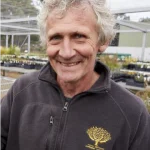 John Arnott
John Arnott
Manager of Horticulture, Royal Botanic Gardens Victoria
John works in conservation horticulture, caring for threatened plant species through ex situ cultivation. Adding conservation to the horticultural mix has led to a project titled Care for the Rare, a Victorian Botanic Gardens initiative supporting the work of regional botanic gardens, who develop collections of locally significant rare and threatened plant species.
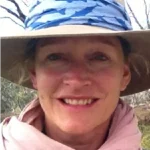 Dr Megan Hirst
Dr Megan Hirst
Post-Doctoral Fellow, Royal Botanic Gardens Victoria
Megan works with the Victorian Conservation Seedbank (VCS), which performs as a primary facility for the conservation of the state’s most threatened plants. VCS staff collect seed in the wild, and manage the complexity of storing native Victorian plants, particularly endemics and at-risk species, including effective long-term germplasm storage, germination characteristics, and propagation. Building on the seedbank work, Meg and RBGV colleagues collaborate on public programs such as Botany Bootcamp and Raising Rarity, which aim to motivate people to become involved in plant conservation.
 Dr Joanna Sumner
Dr Joanna Sumner
Manager, Genetic Resources, Museums Victoria
Joanna is a geneticist and conservation biologist who manages the research laboratories and the Ian Potter Australian Wildlife BioBank at Museums Victoria. The BioBank contains irreplaceable tissue samples and DNA from Australian animals, used for research on evolution, taxonomy, and conservation. With the addition of the Ian Potter Australian Wildlife BioBank, the museum is taking a more proactive approach, preserving tissue samples from species at risk of extinction in a state-of-the-art liquid nitrogen cryofacility for long-term storage. This resource offers conservation biologists in the field an opportunity to reintroduce genetic diversity to small populations at threat of extinction.
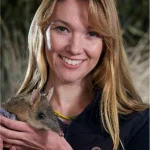 Dr Marissa Parrott
Dr Marissa Parrott
Reproductive Biologist, Zoos Victoria
Marissa is the Reproductive Biologist at Zoos Victoria, a zoo-based conservation organisation fighting extinction for some of the world’s most endangered species. Marissa works across Healesville Sanctuary, Werribee Open Range Zoo, Melbourne Zoo and a variety of field locations to improve sustainable wildlife populations, reproductive research, and captive breeding and reintroduction success. She has a particular focus on threatened species, including the endangered Mainland Eastern Barred Bandicoot and the critically endangered Mountain Pygmy-possum.
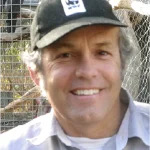 Darren Grover
Darren Grover
General Manager, Threatened Species, Zoos Victoria
Darren joined Zoos Victoria this year following a career as Head of Healthy Land and Seascapes for the World Wildlife Fund in Australia. He is now managing Zoos Victoria’s challenging mission to protect 27 key species from extinction in Australia through a variety of special programs and interventions.
Please note: This forum will be livestreamed via Facebook Live from the pages of the Parliament of Victoria and the Royal Society of Victoria; please tune in at 3:00PM AEST on Sunday, 21st August to follow the broadcast and submit your questions to the panel.

In-person attendance at this event is for members and invited guests of the Royal Society of Victoria, the Royal Botanic Gardens Victoria, Museums Victoria and Zoos Victoria, so the ticket option will only be available once your access code has been entered. Please contact the Royal Society of Victoria ([email protected]) if you are unsure of your code. If you are not a member but would like to join the Society, please refer to our website.



